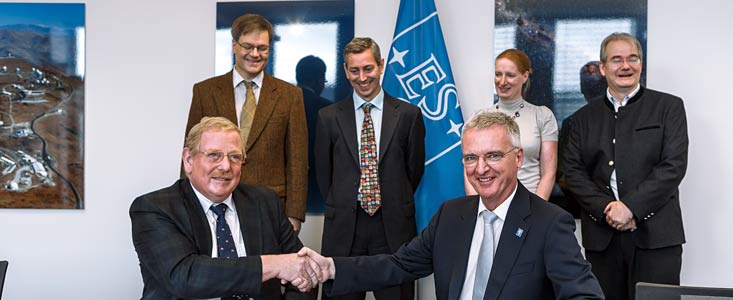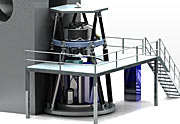Anuncio
Firma del Acuerdo para la cámara MICADO del E-ELT
18 de Septiembre de 2015
ESO ha suscrito un acuerdo con un consorcio de institutos de diversos países europeos [1], que involucran el diseño y construcción de la cámara MICADO (siglas en inglés para Multi-AO Imaging Camera for Deep Observations), uno de los instrumentos para la primera luz del European Extremely Large Telescope (E-ELT). MICADO será la primera cámara generadora de imágenes del telescopio gigante, y elevará el potencial de la óptica adaptativa a un nivel aún no alcanzado.
El acuerdo fue firmado por Reinhard Genzel, Director del Instituto Max-Planck para Física Extraterrestre, como representante del consorcio, y Tim de Zeeuw, Director General de ESO, en una ceremonia realizada en la Sede Central de ESO, el 18 de septiembre de 2015. Se contó con la presencia del Investigador Principal de MICADO, Ric Davies.
Desde la primera luz, MICADO dotará al E-ELT con capacidad para generar imágenes limitadas por difracción en longitudes de onda de infrarrojo cercano. El diseño de MICADO fue impulsado por el anhelo de lograr alta sensibilidad y resolución, precisión astrométrica y amplitud de rango espectral cubierto.
El diseño de MICADO se ha optimizado para ser utilizado con el sistema MAORY (Unidad de Óptica Adaptativa Multi Conjugada), un nuevo módulo de óptica adaptativa que opera en conjunto con la nueva estrella guía láser del E-ELT, pero puede también utilizarse con otros sistemas de óptica adaptativa.
MICADO permitirá aplicar la máxima resolución del telescopio gigante a diversas áreas de investigación modernas. Éstas incluyen captar imágenes en detalle de la estructura de galaxias de alto desplazamiento al rojo, el estudio de estrellas individuales en galaxias cercanas y, mediante su coronógrafo, el descubrimiento y caracterización de exoplanetas. MICADO también será una poderosa herramienta para explorar ambientes donde las fuerzas gravitacionales son extremadamente violentas, tales como aquellas en torno al agujero negro súpermasivo, ubicado al centro de nuestra galaxia, la Vía Láctea.
Además de su rol principal como generador de imágenes, MICADO también contiene un espectrógrafo de una rendija, que resulta ideal para captar el espectro de objetos compactos. En este modo, el instrumento se utilizará para abordar diversas áreas de la astronomía, tales como la medición de las masas de los agujeros negros centrales en galaxias cercanas, a partir de las velocidades de sus estrellas presentes, y la observación de galaxias con alto desplazamiento al rojo para calcular sus edades, composición química e historia. El instrumento también podrá obtener los espectros de supernovas producidas por la primera generación de estrellas masivas en el Universo.
Notas
[1] El consorcio MICADO está compuesto por: MPE: Instituto Max-Planck para Física Extraterrestre (Alemania); MPIA: Instituto Max-Planck para Astronomía (Alemania); USM: Universidad de Sternwarte en München (Alemania; IAG: Universidad de Göttingen Georg-August; Göttingen Stiftung Öffentlichen Rechts (Instituto Ejecutor: Instituto de Astrofísica) (Alemania); NOVA: Escuela de Investigaciones Astronómicas de los Países Bajos (Nederlandse Onderzoekschool voor de Astronomie) (Países Bajos); CNRS/INSU: Centro Nacional de Investigación Científica/Instituto Nacional de Ciencias del Universo (en representación de LESIA, GEPI e IPAG) (Francia); A*: Una asociación austríaca representada colectivamente por la Universidad de Viena. (La asociación A* comprende la Universidad de Viena, la Universidad de Innsbruck, la Universidad de Graz y la Universidad de Linz. Las contribuciones para MICADO provienen de Viena, Innsbruck, Graz y Lunz) (Austria), e INAF-OAPD: Instituto Nacional de Astrofísica del Observatorio de Padua (Italia).
Enlaces
- MICADO: the E-ELT Adaptive Optics Imaging Camera (Davies et al., 2010)
- MICADO (Max-Planck-Institut für extraterrestrische Physik) (Instituto Max Planck para Física Extraterrestre).
- MICADO en la Universidad de Göttingen
Contactos
Ric Davies
Investigador Principal de MICADO
Max-Planck-Institut für extraterrestrische Physik
Garching bei München, Alemania
Tel: +49 89 30000 3298
Correo electrónico: davies@mpe.mpg.de
Hannelore Haemmerle
Encargado de Prensa, MPE
Max-Planck-Institut für extraterrestrische Physik
Garching bei München, Alemania
Correo electrónico: hanneh@mpe.mpg.de
Suzanne Ramsay
ESO Project Scientist
Garching bei München, Alemania
Tel: +49 89 3200 6665
Correo electrónico: sramsay@eso.org
Richard Hook
Encargado de Prensa, ESO
Garching bei München, Alemania
Tel: +49 89 3200 6655
Celular: +49 151 1537 3591
Correo electrónico: rhook@eso.org
Sobre el anuncio
| Identificador: | ann15068 |
Our use of Cookies
We use cookies that are essential for accessing our websites and using our services. We also use cookies to analyse, measure and improve our websites’ performance, to enable content sharing via social media and to display media content hosted on third-party platforms.
ESO Cookies Policy
The European Organisation for Astronomical Research in the Southern Hemisphere (ESO) is the pre-eminent intergovernmental science and technology organisation in astronomy. It carries out an ambitious programme focused on the design, construction and operation of powerful ground-based observing facilities for astronomy.
This Cookies Policy is intended to provide clarity by outlining the cookies used on the ESO public websites, their functions, the options you have for controlling them, and the ways you can contact us for additional details.
What are cookies?
Cookies are small pieces of data stored on your device by websites you visit. They serve various purposes, such as remembering login credentials and preferences and enhance your browsing experience.
Categories of cookies we use
Essential cookies (always active): These cookies are strictly necessary for the proper functioning of our website. Without these cookies, the website cannot operate correctly, and certain services, such as logging in or accessing secure areas, may not be available; because they are essential for the website’s operation, they cannot be disabled.
Functional Cookies: These cookies enhance your browsing experience by enabling additional features and personalization, such as remembering your preferences and settings. While not strictly necessary for the website to function, they improve usability and convenience; these cookies are only placed if you provide your consent.
Analytics cookies: These cookies collect information about how visitors interact with our website, such as which pages are visited most often and how users navigate the site. This data helps us improve website performance, optimize content, and enhance the user experience; these cookies are only placed if you provide your consent. We use the following analytics cookies.
Matomo Cookies:
This website uses Matomo (formerly Piwik), an open source software which enables the statistical analysis of website visits. Matomo uses cookies (text files) which are saved on your computer and which allow us to analyze how you use our website. The website user information generated by the cookies will only be saved on the servers of our IT Department. We use this information to analyze www.eso.org visits and to prepare reports on website activities. These data will not be disclosed to third parties.
On behalf of ESO, Matomo will use this information for the purpose of evaluating your use of the website, compiling reports on website activity and providing other services relating to website activity and internet usage.
Matomo cookies settings:
Additional Third-party cookies on ESO websites: some of our pages display content from external providers, e.g. YouTube.
Such third-party services are outside of ESO control and may, at any time, change their terms of service, use of cookies, etc.
YouTube: Some videos on the ESO website are embedded from ESO’s official YouTube channel. We have enabled YouTube’s privacy-enhanced mode, meaning that no cookies are set unless the user actively clicks on the video to play it. Additionally, in this mode, YouTube does not store any personally identifiable cookie data for embedded video playbacks. For more details, please refer to YouTube’s embedding videos information page.
Cookies can also be classified based on the following elements.
Regarding the domain, there are:
- First-party cookies, set by the website you are currently visiting. They are stored by the same domain that you are browsing and are used to enhance your experience on that site;
- Third-party cookies, set by a domain other than the one you are currently visiting.
As for their duration, cookies can be:
- Browser-session cookies, which are deleted when the user closes the browser;
- Stored cookies, which stay on the user's device for a predetermined period of time.
How to manage cookies
Cookie settings: You can modify your cookie choices for the ESO webpages at any time by clicking on the link Cookie settings at the bottom of any page.
In your browser: If you wish to delete cookies or instruct your browser to delete or block cookies by default, please visit the help pages of your browser:
Please be aware that if you delete or decline cookies, certain functionalities of our website may be not be available and your browsing experience may be affected.
You can set most browsers to prevent any cookies being placed on your device, but you may then have to manually adjust some preferences every time you visit a site/page. And some services and functionalities may not work properly at all (e.g. profile logging-in, shop check out).
Updates to the ESO Cookies Policy
The ESO Cookies Policy may be subject to future updates, which will be made available on this page.
Additional information
For any queries related to cookies, please contact: pdprATesoDOTorg.
As ESO public webpages are managed by our Department of Communication, your questions will be dealt with the support of the said Department.





